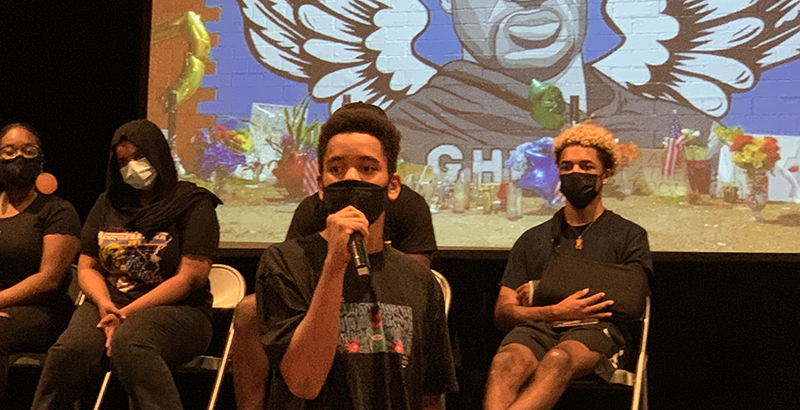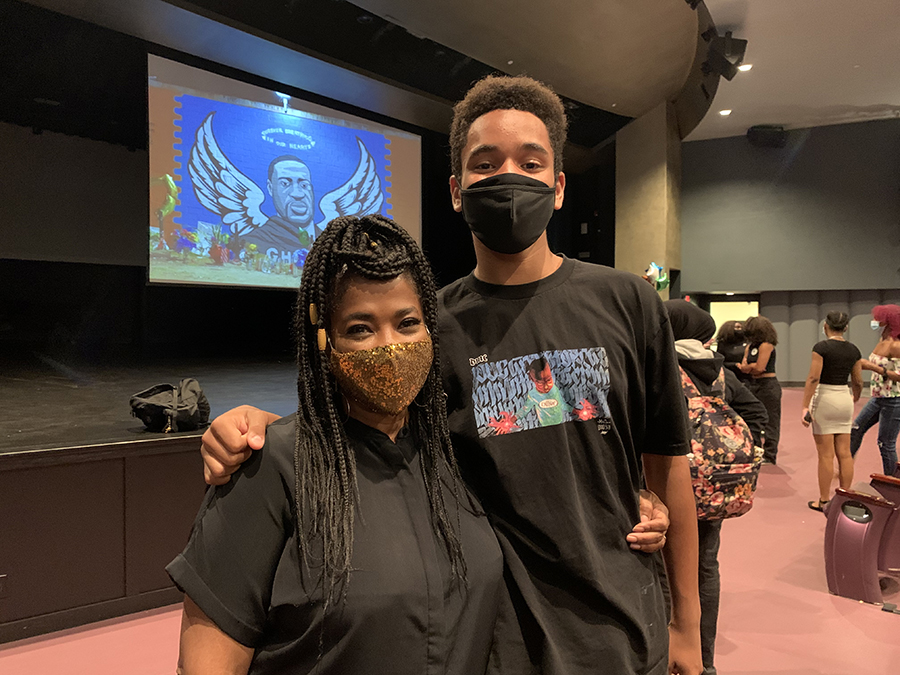‘Nine Minutes and 29 Seconds’: Students at a Suburban Minneapolis HS Mark 1st Anniversary of George Floyd’s Death, Push for Change

Updated | Get essential education news and commentary delivered straight to your inbox. Sign up here for The 74’s daily newsletter.
From the stage at the front of the St. Louis Park High School auditorium, Evan Nelson invited his classmates to join him in observing the one-year anniversary of George Floyd’s murder. The room, he explained, would remain silent for the same amount of time a police officer kneeled on Floyd’s neck outside a convenience store nearby, in Minneapolis.
“If this nine minutes and 29 seconds makes you uncomfortable, imagine how it was for George Floyd,” Nelson, a senior and a leader of the school’s chapter of SOAR — Students Organized for Anti-Racism — told the students gathered.
A profound sadness seemed to settle over the room. Hoods went up and hijab-draped heads bowed.
At the one-minute mark, St. Louis Park Mayor Jake Spano, a supporter of the students’ work, reached into his suit coat to quiet a vibrating phone.
At about 2½ minutes, Lee-Ann Stephens, the group’s adviser and Minnesota’s 2006 teacher of the year, began shaking her head.
Half a minute later, a boy with a Justin Bieber haircut pulled up his cloth mask, using it to blot the corners of his eyes under his glasses.
Nearly five minutes into the silence, three tall boys quietly slipped in. They had been listening from the cafeteria; because of social distancing, not all the students could safely fit in the auditorium.
Other than that, everyone was still.
The silence followed an hour of student-led raw talk about Floyd; Daunte Wright, killed by a police officer in April in another Minneapolis suburb; the discomfort among many white teachers about topics involving race; and the low expectations some educators hold for students of color.
Never mind that right-leaning politicians around the country are decrying classroom discussion of institutionalized racism; the bottom line for these students is to make school a place where talk about social justice is frequent and frank.
“I want to talk about neutrality,” freshman Calvin Zimmerman intoned, mic in hand. “Derek Chauvin tortured George Floyd. What is there to be neutral about?”

From the stage, junior Amal Abdi called out the lack of students of color in Advanced Placement and honors classes. From the back of the room, a boy concurred: “If you’re not doing well in math by the fourth grade, you’re just gonna get left behind.”
The teens said they want teachers to get comfortable talking about race and to check in on their students. “It’s so traumatizing to see someone who looks like you get killed,” said one. “Obviously, I’m going to say I’m okay, but I’m clearly not.”
“I heard a lot of teachers call it the George Floyd trial, even though George Floyd was not on trial,” said another.
About halfway through the event, a young man with sky-blue hair stood and said he didn’t think it was right that after Floyd’s death, people took the opportunity to engage in illegal actions, like burning sections of the city. A couple of students booed, while others shot back that the protests were both rational and effective in drawing attention to police brutality and racism.
“What has to happen for you not to stay silent anymore?” one asked.
“That Target store you’re worried about?” said another. “It’s back up. It’s fine. You know what isn’t fine? George Floyd.”
From the stage, senior Grace Kanyinku affirmed her classmates. “Thanks for that,” she said, gesturing at the boy with blue hair, “because that’s something a lot of people are feeling. And thanks for the responses, because that’s also something people feel.”
For some, school is the only place they can hold conversations that are too tough for other settings. “I’m white, and my parents always turn off the radio when a story comes on about police brutality,” one girl said.
“Another thing teachers need to talk about is white privilege,” a senior opined. “A lot of people are reluctant to talk about it, and it is an issue in our community.”
Another struggled to find the right words for the enormity of the moment: “It sucks that it’s all so … whitewashed.”
Get stories like these delivered straight to your inbox. Sign up for The 74 Newsletter

;)
